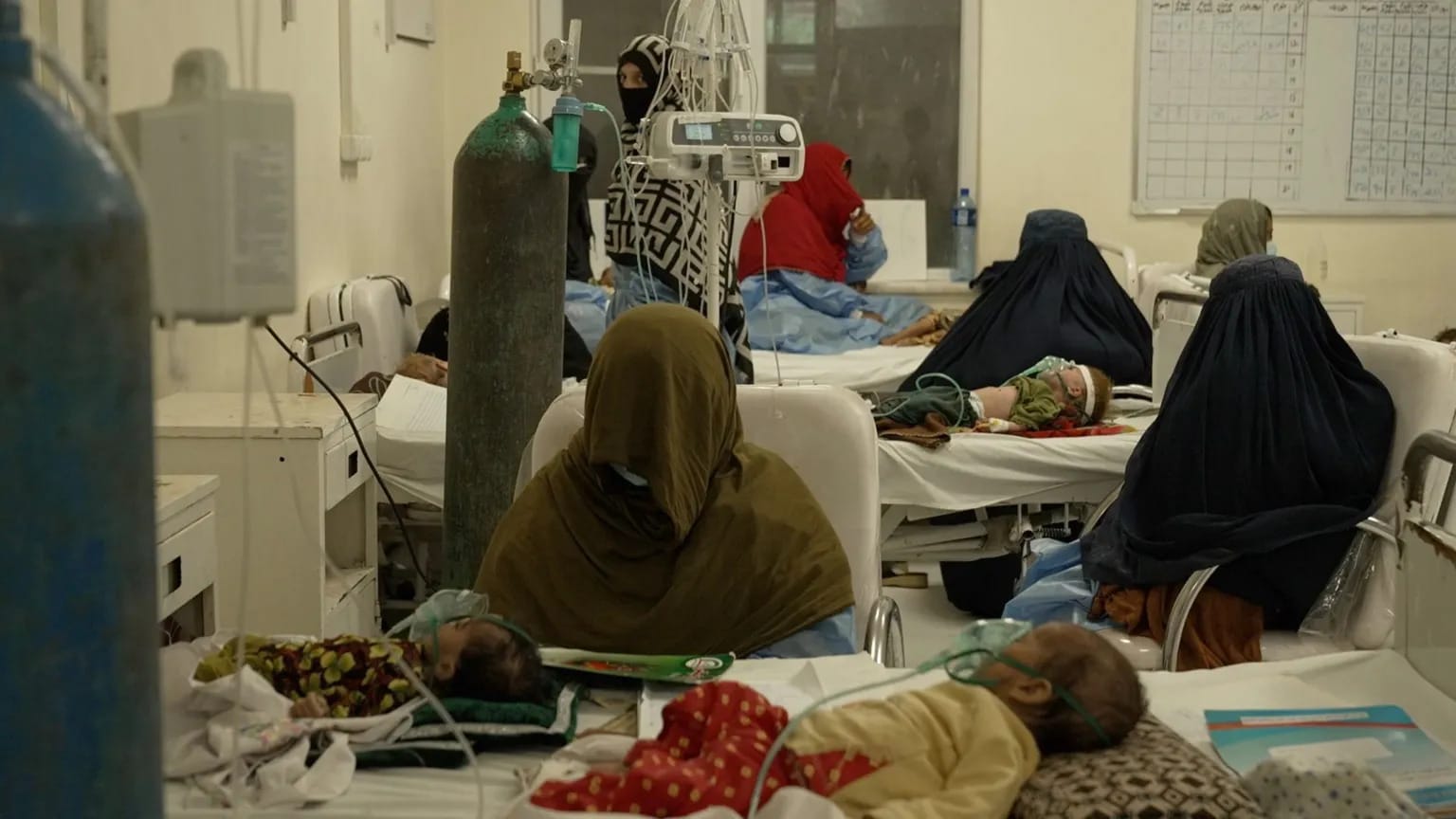Struggling to save its malnourished infants, the hospital
“The doctor said treatment could help him, but we can't afford it. How can we pay for the treatment?” Robina, who had to leave Pakistan last year, laments.

“This is like doomsday for me. I feel so much grief. Can you imagine what I’ve gone through watching my children dying?”
Amina says, having lost six of her children, all before the age of three, with another battling for her life. Seven-month-old Bibi Hajira, who is the size of a newborn and suffers from severe acute malnutrition, occupies half a bed at Jalalabad regional hospital in Afghanistan's eastern Nangarhar province.
“My children are dying because of poverty. All I can feed them is dry bread and water that I warm up by keeping it out under the sun,” Amina says, her anguish palpable.
Bibi Hajira is one of 3.2 million children suffering from acute malnutrition, a dire situation exacerbated by decades of war, extreme poverty, and the recent Taliban takeover. The current crisis has reached unprecedented levels.
The gravity of the situation is evident in the hospital’s malnutrition ward, where 18 toddlers share seven beds. It’s not a seasonal spike but a constant struggle.
The room is eerily silent, broken only by the beeps of a pulse rate monitor. Most children are too weak to move or make a sound. Three-year-old Sana, who lost her mother during childbirth, lies with her arm over her face.
In the adjacent bed, three-year-old Ilham is far too small for his age, with skin peeling off his arms, legs, and face. One-year-old Asma, with beautiful hazel eyes, is struggling to breathe through an oxygen mask, and Dr. Sikandar Ghani, her physician, expresses doubt about her survival. Less than an hour later, Asma passed away.
Seven hundred children have died in the past six months at the hospital, with more than three deaths per day, according to the Taliban’s public health department in Nangarhar. This staggering number might have been even higher if not for the support from World Bank and UNICEF funding.
Following the Taliban's takeover in August 2021, international funds supporting public healthcare were halted due to sanctions, leading to a healthcare crisis.

Aid agencies provided temporary relief, but this has proven unsustainable as global focus shifts and funding diminishes.
The Taliban’s restrictions on women have further discouraged donors. “We inherited the problem of poverty and malnutrition, which has worsened due to natural disasters like floods and climate change.
The international community should increase humanitarian aid without tying it to political issues,” said Hamdullah Fitrat, the Taliban government’s deputy spokesman.
Visits to various health facilities reveal the deteriorating situation, but evidence shows that appropriate treatment can make a difference. Bibi Hajira, initially in a fragile state, has improved and been discharged, Dr. Ghani confirmed.
Malnutrition is not the sole cause of the surge in child mortality. Preventable and curable diseases also contribute.
In the intensive care unit next to the malnutrition ward, six-month-old Umrah battles severe pneumonia. Her mother, Nasreen, is overwhelmed with fear. Two days after the visit, Umrah also passed away.
The pressure on Jalalabad hospital is immense, serving a population of five provinces, estimated by the Taliban to be around five million.
This pressure has intensified with the arrival of over 700,000 Afghan refugees deported from Pakistan since late last year.
Additionally, a troubling statistic from the UN indicates that 45% of children under five in Afghanistan are stunted.

Robina, a mother from a dusty settlement near Jalalabad, worries about her two-year-old son, Mohammed, who cannot stand and is much shorter than his peers.
“The doctor said treatment could help him, but we can't afford it. How can we pay for the treatment?” Robina, who had to leave Pakistan last year, laments.
UNICEF warns that stunting can cause severe, lifelong physical and cognitive damage. “Afghanistan is already struggling economically.
If large sections of our future generation are physically or mentally disabled, how will our society cope?” Dr. Ghani asks.
In Sheikh Misri, families with malnourished or stunted children are common. Sardar Gul’s children, Umar and Mujib, highlight the importance of timely intervention.
After registering Mujib with an aid agency, food sachets helped him gain weight from less than three kilos to six kilos, though he remains underweight.
This improvement underscores that timely intervention can save children from death and disability.





